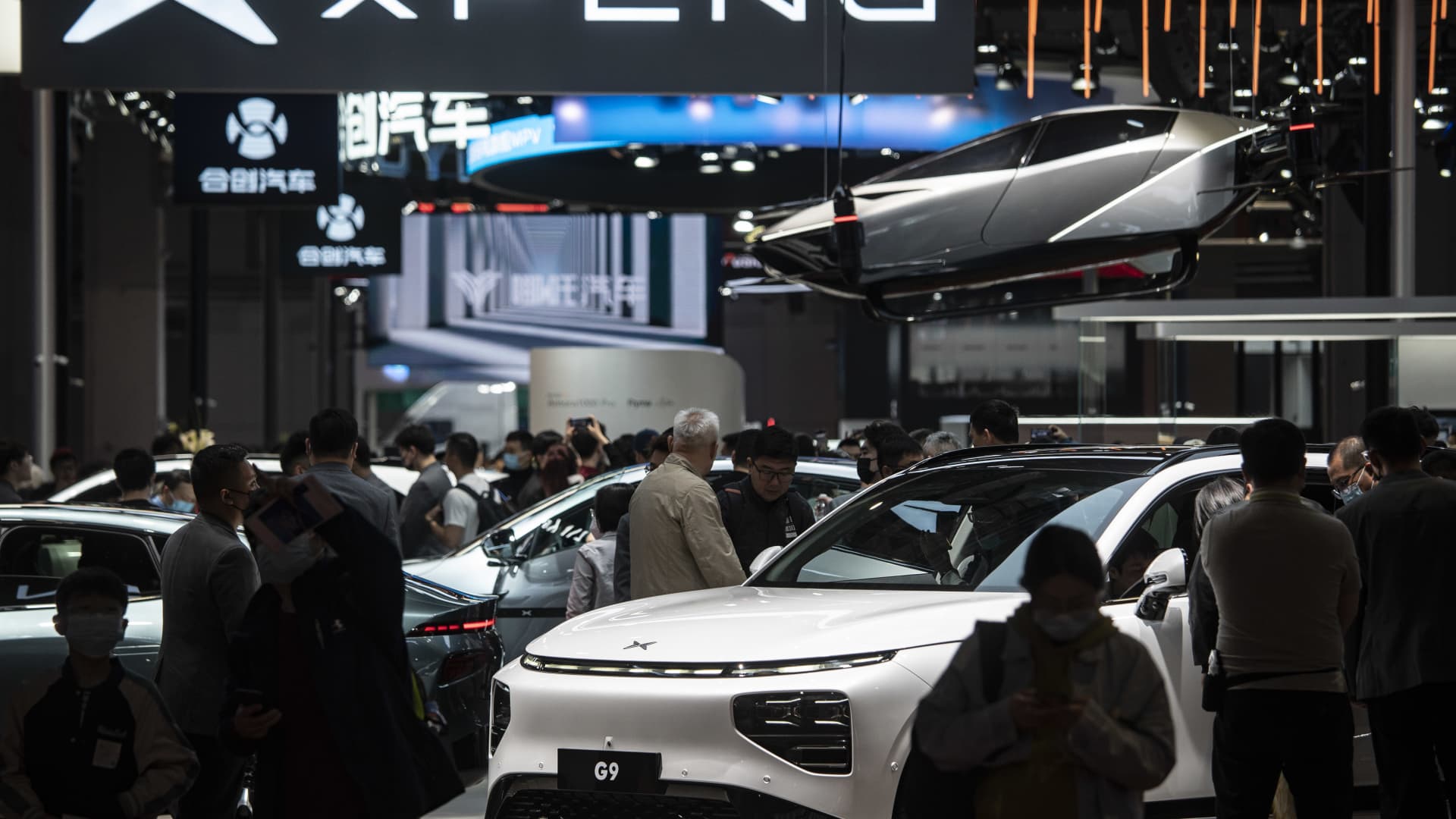Chinese electric vehicle company Xpeng told CNBC on Friday that its newly launched X9 model could be a “game changer” for the industry.
Xpeng launched the X9 large 7-seater EV on Jan. 1, a car built on its SEPA2.0 architecture for the Chinese market. The X9 series are priced between 359,800 yuan to 419,800 yuan (about $50,360 to $58,760) with immediate deliveries.
“For X9, we actually anticipate this to be a game changer for the battery electric vehicles segment for MPVs (multi-purpose vehicles),” Brian Gu, vice chairman and co-president of Xpeng, told CNBC’s Emily Tan in an exclusive interview.
“We believe this could be the top seller in its category … because I think it has some very innovative technology and design as well as superior handling, industry leading smart driving technology – packed into a very beautifully designed product,” said Gu.
Xpeng’s new launch comes as several domestic EV players such as Nio, Huawei and Zeekr recently revealed new electric vehicles. Even Chinese consumer electronics company Xiaomi is launching its first EV to compete in the market.
We anticipate in 2024, we will be growing much faster than the industry growth which means that we can expand our market share.
Brian Gu
Vice Chairman and Co-President, Xpeng
Xpeng has laid out ambitious plans to roll out driver-assist technology in China by end of last year and in Europe by the end of 2024.
The Chinese EV maker also entered into a cooperation framework agreement with Guangdong Huitian on Jan. 2 to manufacture, develop and sell flying vehicles, where Xpeng will provide research and development, technology consulting services and sales agent services to Guangdong Huitian.
“We anticipate in 2024, we will be growing much faster than the industry growth which means that we can expand our market share,” said Gu, adding that the firm will be looking to increase profit margins with greater scale and better product mix.
“The X9 will be a very high margin product for us,” said Gu.
Stiff competition
Competition is intensifying in the Chinese EV market, with BYD, Li Auto and Geely among the small number of players that have hit their annual sales targets.
Xpeng and Nio were among those that missed their targets.
Xpeng delivered a total of 141,601 units in 2023, a 17% increase from a year ago. This fell short of the firm’s target of delivering 200,000 vehicles for the year as reported by local media.
“The focus of investors [for 2024] is whether the company can maintain decent delivery momentum with new launches and improve profitability in a challenging pricing environment, in our view,” said Morningstar analyst Vincent Sun in a Nov. 16 note on Xpeng.
2024 will be a very competitive year with obviously a number of new models as well as new brands launching in the segment.
Brian Gu
Vice Chairman and Co-President, Xpeng
Nio delivered 160,038 vehicles in 2023, representing an increase of 30.7% compared to a year ago — but it still was well below its target of about 245,000 cars based on management’s target to “double the volume” of 2022 during their fourth quarter earnings call.
Li Auto delivered 376,030 vehicles in 2023 – meeting its annual delivery milestone of 300,000 vehicles.
In terms of sales, BYD met its 3 million target in 2023 and surpassed Tesla as the world’s top-selling EV brand in the fourth quarter, selling more battery-powered vehicles than its U.S. rival.
BYD produced 3.05 million vehicles in 2023 while Tesla said it made 1.84 million vehicles that same year.
‘Strong momentum’
Gu is optimistic on China’s EV market in 2024 despite challenges, saying that “2024 will be a very competitive year” with new model and brand launches.
“I think that the EV sector in China ended on a very high note in the fourth quarter, if you look at the penetration rates approaching 40% towards the end of this 2023, which is the high point that we have seen in the industry,” said Gu. “So all that points to a strong momentum.”
According to TrendForce, China’s new energy vehicle penetration rate exceeded 40% for the first time in November and “optimistic growth” is anticipated by 2024.
“I think we will continue to see a number of the catalysts that’s propelling the growth of the new energy vehicle market, obviously the technology, the product launches, as well as the continued conversion from internal combustion engines to new energy vehicles,” said Gu.
The new energy category includes electric and plug-in hybrid power sources.
“But in order to be competitive, I think we still need to focus on differentiating innovative technology as well as maintaining a very strong cost-competent competitive advantage with scale as well as technological innovations,” he added.
